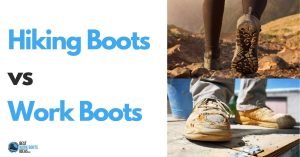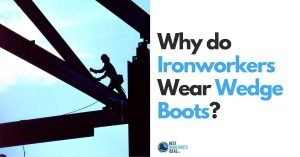Stop the Killing! Comfort and Security for Your Feet With an Eye Towards Kindness: Everything You Need to Know About Vegan Work Boots
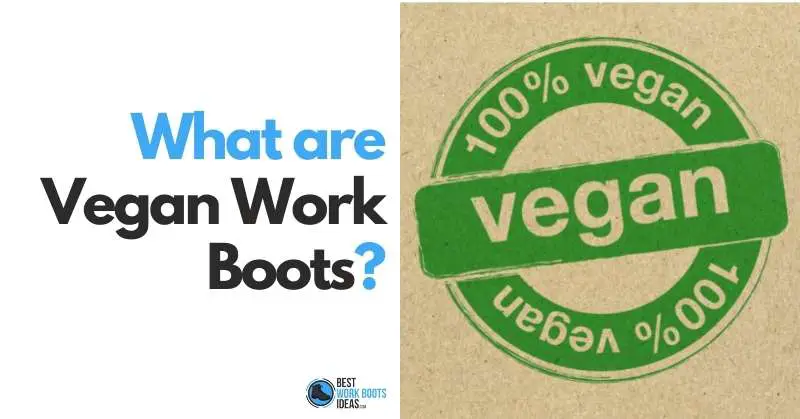
As times change, it’s not uncommon to revisit choices we’ve been making for decades, centuries, and even longer.
One of these topics is in regards to the materials used to make our footwear.
Leather has been the go-to shoe material for millenia, but there are a growing number of consumers who aren’t comfortable with an animal giving its life for their meal or their shoes.
Because we’re a boot website, it’s important that we cover the topic of Vegan Footwear, particularly in regards to safety and work boots.
Contents
What is A Vegan Boot?
Vegan work boots are boots constructed without any sort of material made or derived from a living creature.
Primarily, this means the leather used in most boot uppers, but isn’t limited to that.
The purpose of these boots is to provide footwear that no animals suffered to make.
This may seem like a pretty open and shut case, “no leather, got it,” but there’s more to it than that.
There are many materials in our daily lives and our footwear that we don’t consider to be an animal product, but absolutely are.
What is Vegan Leather?
Vegan leather is the name given to synthetic material that mimics the look and feel of real animal skin.
It is considered vegan because it’s a man-made material, not from an animal.
What About Wool or Vegan Suede?
There are many vegans who choose to continue wearing wool or suede, as they prefer their appearance over artificial vegan materials.
As long as it wasn’t derived from animals, there’s no problem with this decision at all.
No Preaching, Just Teaching: A Note From the Author
Just to make it clear: I’m not a vegan.
I have leather footwear (dress shoes and work boots), and I’ve only gone as far as ‘considering the idea’ of any sort of lifestyle free of animal products.
With that disclaimer out of the way, I promise I’m not going be gratuitous, preachy, or any form of a do-gooder bully that tries to guilt you into agreeing with me; I can’t stand that and I’m always turned off when someone presents ideas in that manner.
Truthfully, I’m not sure I even HAVE a position on this topic.
I’m going to give you information that I’ve researched, you can go make your own decisions.
I feel like this method is far more effective than someone yelling at and shaming you from their ivory tower of “I’m good and you’re bad.”
I don’t learn something with every article I write. In this one I actually learned a lot.
Although at the end of writing this I’ll probably tell myself I won’t change any decisions, it’ll probably be hard not to keep it in mind. I saw some rough stuff while researching this.
If you have an interest in learning more, you can go find that out for yourself. I’m not going to rick-roll you with images of a slaughterhouse or tannery in this article, I promise
That’s enough out of me! Let’s cover some of the materials you might not have known were being produced by animals
Keep it Cruelty-Free: Materials Made of Animals Products to Watch Out For If You Want Your Boots to Be Vegan
If you can’t think of any other materials besides leather that might be making up your boots, keep reading.
There were a few that surprised me as I read this.
There were some materials I’d been aware of for my entire life, never realizing that it came from an animal.
Cashmere is goat wool, who knew?!
Glues and Adhesives
Although less common in modern manufacturing than in the past, some glues and adhesives are made of animal fats and proteins from skin, flesh and bone.
If you’re looking for a vegan shoe, I’d be particularly wary of animal-based adhesives if you’re shopping at a custom cobbler or boutique boot stores.
It’s way more likely that they’ll adhere to an “old world” manufacturing regime.
As far as I know, all major work boot manufacturers use man-made adhesives.
This is in part for ethical reasons, but it’s primarily because they’re easier to make, store, and they simply work better.
Always a good situation when the better product is also the kinder product.
Insulation
Something that applies to workers in colder climates, be mindful of the material used to insulate your winter work boots.
While many boots are now insulated with the famous Thinsulate manufactured by 3M or one of their competitors, there are boots that are still insulated with down feathers or similar animal products.
Bunny Boots are an example of how footwear is made of animal products that are hidden to the naked eye.
The insulation is a mixture of layers of wool and felt.
The wool, definitely an animal product.
The felt? I’ve written an email to the company and am waiting to hear back.
Either way, it highlighted to me that felt can be either an animal product or a synthetic creation (another surprise).
If you’re serious about making sure your boots are warm and vegan, make sure you look into what material is insulating you.
Liners and Padding
Designed to keep you comfy, not warm, the liner and padding in your boots can also be made of a number of animal products.
I don’t want to make the entire article about listing different materials, so check this article which gives a thorough list of all the possible materials that could make boots not vegan.
Laces
Yeah, your laces could potentially be made of leather or other animal products.
This isn’t a super common thing, nor is it difficult to notice, but just check what material is keeping your boots on your feet.
The Ways You Can Make Sure Your Boots Are ACTUALLY Vegan
Writing letters to manufacturers prior to buying, as well as seeking out vegan-centric brands are the two best ways you can go about ensuring that your footwear is 100% committed to your ideals.
The biggest challenge in finding vegan footwear is inadequate product descriptions and apathetic salespeople.
A little bit of research and patience before you leave the house, or get click-happy, to buy will guarantee you’re getting a product that aligns with your values.
I regularly write emails to manufacturers asking them to specify what they mean when they make a vague claim.
The answers I get aren’t always awesome, but even that allows me to see whether or not a particular brand takes their customers’ concerns seriously.
For the article I did on boots for asphalt workers, I wrote an email to find out what exactly was meant by a certain manufacturer claim.
I wanted to make sure I wasn’t giving readers information that could get them hurt.
Sure enough, a particular manufacturer wrote back and let me know that while their shoes were resistant to heat, they weren’t “heat-resistant,” and would melt in the temperatures asphalt workers experience.
Thank God! I don’t want that on my conscience! That boot quickly got dropped from the list.
Who’s Calling The Shots? Who Decides and How to Tell if a Boot is Certified Vegan
There is no oversight body to certify boots as being vegan, so it’s up to the manufacturer to tell you what materials go into the making of their product.
Will Vegan Work Boots Provide The Same Level of Protection as My Regular Work Boots?
Vegan work boots are just as capable of keeping your feet safe as the leather ones you’re used to.
There’s nothing about vegan footwear that prevents manufacturers from putting the same exact safety features in their boots.
Why Would I Want Vegan Work Boots?
You’d want vegan work boots if promoting animal welfare is something that matters to you.
Even one person making the choice to stop buying things made with animal products signals to manufacturers that if they want your business, they’re going to have to align with your ethics
What Brands Make Vegan Work Boots?
Many well-known brands make vegan boots, even if they’re not labeled as such.
You might see something advertised as 100% synthetic, which is another way of saying vegan.
It’s not uncommon for a brand that makes non-vegan products to also offer vegan options.
Any brand you’re already comfortable wearing, check their website, write a quick email and you’ll be able to find out if they have any styles to suit your needs.
How Much Do Vegan Work Boots Cost Compared to Regular Work Boots?
Vegan work boots are usually comparably priced to their leather alternatives.
The differences in cost you’ll see between vegan and non-vegan boots has more to do with the various features a particular boot will or will not have.
Do Vegan Work Boots Come With Slip Resistant Outsoles?
Vegan work boots can absolutely be built with ASTM-rated slip resistant outsoles.
The part of the boot that is responsible for providing slip-resistance has nothing to do with anything that would make it vegan or not vegan.
Are Vegan Work Boots OSHA Approved?
Vegan work boots are OSHA approved so long as they have a protective toe cap that’s been rated by ASTM as 2413 I/C-75, and usually slip- and oil- resistant outsoles. OSHA doesn’t focus on vegan or non-vegan, they’re happy to approve any boot that keeps workers safe.
Keep in mind, your specific job might require additional ASTM-rated features like puncture resistant outsoles, insoles, static dissipative outsoles, metatarsal protection, etc…
Just speak with your boss, foreman, or the HR/safety department at your job to find out exactly what features you’ll need from your boots in order to be square with them and for OSHA compliance.
Are Vegan Work Boots as Durable as Leather? How Long Do They Last?
Yes, vegan boots are just as tough as their animal-based counterparts
Synthetic uppers are capable of lasting years, although I advise keeping away from any “faux leathers.”
It’s best to go with full synthetic materials that aren’t pretending to be something they’re not.
Faux leather has been studied and proven to be less durable than real leather.
Vegan Work Boot Brands
There are a few familiar brands you may recognise that provide Vegan work boots.
Carhartt
Carhartt have a number of synthetic hiking boots that you may want to consider.
Dr. Martens
The Calamus Safety toe boot synthetic range are a good starting point.
Other brands you might also want to look at aare;
- STC Footwear
- Airseal
- Fugu
A Final Take
One author I read who spoke about this topic noted that the argument wasn’t against ever using animals for food and materials, just that it wasn’t a necessity of modern life.
Modern technology has allowed us to escape from this less-than-savory behavior of our past.
We should be happy to take this opportunity.
I felt that was the best argument I’ve heard, as it was without the syrupy emotional appeal that is so often attached to topics such as this.
I encourage you to look inside yourself and see if any of this resonates with you. If not, I’m not the one to tell you twice. Your life, your choices!

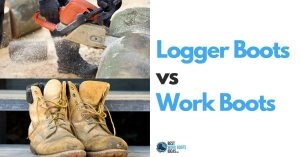
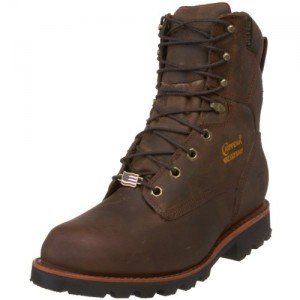
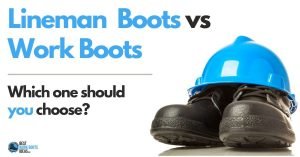
![What are the 5 Best Pull On Waterproof Work Boots for Men like You? [Mini Review + Buying Guide]](https://www.bestworkbootsideas.com/wp-content/uploads/2019/08/Carhartt-11-Inch-Steel-Toe-Wellington-CMP1220-300x300.jpg)
